Robert Knox's Blog, page 20
June 21, 2018
The Devil's Garden: "The American Gulag -- An Elegy"
 After the fake-President's latest decree ending the practice of separating parents and children seeking refuge at our border, there are two major points to keep in mind. Families seeking refugee status at the Mexican border will still be treated like criminals. Families may not be separated, but they will together behind bars -- indefinitely.Secondly, US government officials claim they have no way to help families reunite and no intention of offering any assistance to parents (who are, remember, criminals) seeking to find their stolen children. The lack of accurate records reveals our government's unwillingness to treat refugees as real human beings with names and personal histories, and family members such as parents who also had names.
After the fake-President's latest decree ending the practice of separating parents and children seeking refuge at our border, there are two major points to keep in mind. Families seeking refugee status at the Mexican border will still be treated like criminals. Families may not be separated, but they will together behind bars -- indefinitely.Secondly, US government officials claim they have no way to help families reunite and no intention of offering any assistance to parents (who are, remember, criminals) seeking to find their stolen children. The lack of accurate records reveals our government's unwillingness to treat refugees as real human beings with names and personal histories, and family members such as parents who also had names. Here's my poem about the practice of separating families and the implications of America's attitude toward those seeking refuge here.
The American Gulag: An Elegy
O, weep for America -- she is dead! O weep for Liberty's long shuttered flame!
Weep not for the family of Márcio Goulart do Nascimiento who crossed the river for fear of being murdered by the neighborhood drug house in Brazil, where police told him, 'if you complain you will be killed.' For now they are safely jailed in Texas, Marcio and his wife in one place, his two children somewhere else in the American gulag, convicted of infringing on the peace and security of the great Land of Liberty because, as he himself confessed, "I did not wish us to be killed."
Weep not for Juan Francisco Fuentes Castro, fleeing the violent streets of El Salvador, who sought only, he pled ("may it please the Court") to bring his children to safety, for surely they are safe now behind bars. Some day, perhaps, he will see them again.
Nor weep for poor José de Jesús Días of Mexico, who fails to understand why the court cannot tell him where his daughter is. And so he alone will not accommodate the Court with the obligatory guilty plea until someone can tell him where in this land of freedom they have placed her, safe behind bars.
For it is a simple thing, is it not, to declare one's guilt for wetting one's feet in the sacred waters of Destiny's Dividing Line in order to preserve the lives of one's own family members? The Madonna would understand. The Savior would understand. The judge too sympathizes, but his hands are tied by the bonds of Liberty. Weep not for José de Jesús Días, for he is patently 'illegal.' His daughter too is illegal, but now no doubt safe in a place made of bars and uniforms, among the tribes of lost children.
Nor let us shed our tears for the sufferings of Elizabeth González Juárez, who alone among so many, knows where her daughter is. She crossed the River of Tears from Guanajuato, Mexico, to protect from harm a three-year-old child, abused by her drug-dealing father, and sought the healing Balm of Gilead in the home of her own mother who dwells among the kind and peace-loving souls of Fort Worth, Texas. Alas, the Land of Liberty could spare no refuge for a single infant more upon a camel's back of three hundred million souls, and so delivered the child straight into the hands of her rightful, family-abusing, drug-dealing father. It is the American Way.
Weep not, I say, for the 17 defendants dispatched by the Court in an hour-plus session, finishing in time for lunch. All are guilty.
But, in the quiet watches of the night, lend a thought for a thousand children, and yet a thousand more (by unofficial count at best) young minds and hearts below the age of legal consent ripped from the arms of their parents in a few weeks' time on the strength of a Liberty-abusing Demonic Decree. How many more victims, both old and young, lie in separate hells among the thousands denied refuge in the Home of the (no longer) Free?
Now is the time for your tears.
(Names and other facts taken from The Guardian newspaper: see https://www.theguardian.com/us-news/2...)
Published on June 21, 2018 12:41
June 14, 2018
The Thorny Garden: Republic and Empire, Rome and America, and Imperial Tendencies in the Current Mor-ass
 Everyone is familiar with the historical catastrophe called "The Fall of the Roman Empire." What's less familiar, but far more relevant to our political situation today, is "The Fall of the Roman Republic." Most of us were probably introduced to some of the crucial events in the Roman state's transformation from republic to empire by being required to read Shakespeare's "Julius Caesar" in high schools. (Do high schools still do that?) Or at least watching the classic movie version, with Marlon Brando in the role of Marc Anthony.
Everyone is familiar with the historical catastrophe called "The Fall of the Roman Empire." What's less familiar, but far more relevant to our political situation today, is "The Fall of the Roman Republic." Most of us were probably introduced to some of the crucial events in the Roman state's transformation from republic to empire by being required to read Shakespeare's "Julius Caesar" in high schools. (Do high schools still do that?) Or at least watching the classic movie version, with Marlon Brando in the role of Marc Anthony. Brief refresher: two powerful Roman generals with political ambitions -- Caesar and Pompey -- fight a civil war to see who will be top dog. Caesar wins. His followers want to make him "king," in part to put an end to chaotic political divisions. Before this can happen, a conspiracy of aristocrats who wish to preserve the republic (and "Roman liberties") assassinate Caesar. The pro and anti Caesar factions then fight a civil war. Caesar's followers, under the leadership of Anthony and Octavius, emerge victorious. But pretty soon those two similarly ambitious power-hungry figures fall out and fight another war. Octavius's army triumphs, and he has himself crowned "Emperor." Opponents, and critics of one-man rule such as the Roman political philosopher Cicero, are put to death. Why does this history matter to the United States? In part because the founders of America's Constitutional system of government viewed the Roman Republic as an essential case study in political science. Jefferson, Adams, Franklin and the other leaders of the founding generation desired to create a republican form of government that would protect individual rights and withstand the challenges that -- as in the case of Rome -- undermined a government of laws and patriotic values replaced it with a form of one-man absolutist rule. In their time the British Empire was headed by a monarch. A republic is generally defined as a form of government with an elected head. A democracy is a form of government in which the head of state and other offices are elected by all its citizens, not by a privileged class. Monarchs, or 'kings,' historically claim the right to rule -- in Roman times and as well as in 18th century Europe -- as "absolute monarchs." Absolute rulers have the power, so to speak, to pardon themselves. The king is above the law, because the actions of the king are the law. Other words for this phenomenon: emperor, dictator, archon, tyrant, emperor, strong man, autocrat, czar, kaiser, shah... "sovereign" One-man-rule, supreme leader, fuhrer, el duce, "party chairman," and many others. It's a very popular career choice. But if all power corrupts, and absolute power corrupts absolutely, then protections against placing too much power in the hands of one figure have long been regarded since the time of the Enlightenment -- which spawned America's 'founding generation' -- as essential components in a desirable system of government. The Roman Republic had a number of these protections. For one, the top executive position --called 'consul' -- served only one year. Moreover, two consuls were elected each year to that post, with the clearly stated intention that each would keep an eye on the other. The Roman Senate, which elected the consuls, kept a lot of power for itself. And its own power was diffused by a large membership. But perhaps even more important, according to Rome's own historians, was the Republic's tradition of honorable and public-spirited conduct by those serving in public offices. According to the historians Plutarch, Sallust and Cicero, "republican virtues" such as restraint, honesty, and fairness were inculcated in the country's rulers throughout the early and middle periods of Rome's Republican history. In this atmosphere the highest positions tended to be held by is most able men.
Leaders motivated by these virtues succeeded in guiding their country to unquestioned pre-eminence in its region. Then, according to the historians, Rome's accumulation of great wealth combined with absence of a viable threat from other countries led to a a weakening in traditional values. Personal ambition -- the desire for wealth and fame -- rather than national well-being, drove the conduct of the ruling class. The senatorial class, consisting of the county's wealthiest citizens, no longer put public interest ahead of personal goals, such as ambition, power, 1-percenter wealth, and the decadent pleasure we've learned to now call 'conspicuous consumption.' The country's 'best men' were now corrupted by pure self-interest, ambition and envy: the would-be dictators Gaius Marius and Sulla (Ceasar's forebear) and as the first century BCE drew to a close by rival military titans Caesar and Pompey.
While the Roman Republic was not democracy by modern standards, common citizens, called plebs, had representation in government through an office called the 'tribune' and through their eligibility to serve in the wide-ranging positions of practical, decision-making authority the Romans called "magistrates."
Taken together, these practices and traditions offered the citizenry of the Roman Republic considerable protections against the abuses of power that the consolidation of power in a single figure or 'dynasty' is likely to bring. Given the analysis offered by Plutarch and the others of the causes of the Roman Republic's decline and destruction, followed by the accession of imperial one-man rule -- unchecked, absolute, driven by ambition, vanity, love of power -- no constitutional system, however well devised, is likely to survive the loss of sane, moderate, rational, morally decent standards of conduct by its leaders. Values such as honesty, fairness, respect for others -- including those who hold opposing ideas -- for the rule of law, for facts, for science, for traditional humane ideals -- are at least as important as a Constitutional enumeration of powers (abetted by a centuries-long legal and institutional history of respect for precedent and judicial oversight) to the preservation of popular self-government. This is why the current travesty of America's national government is no laughing matter, even though I am sorely tempted (and often yield to that temptation) to laugh at it. And why I found a few paragraphs in a recent opinion piece appearing in the Boston Globe so provocative. Niall Ferguson is a conservative British political commentator whose basic outlook I abhor. Judging from his piece in the Globe, he believes thinks "slowing China's ascendancy" is more important than protecting democracy, caring about the wellbeing of human beings, or honoring truth. Nevertheless Ferguson makes some very interesting observations in a couple of paragraphs of his op-ed "A Terrible, Horrible, No Good, Very Bad president builds an empire" appearing in the Globe on June 11.
"Think of the world as a three-empire system. It is dominated by the United States, China, and Europe, in that order. Each empire is evolving in a different direction. The American empire, having experienced overextension in Afghanistan and Iraq, has not retreated into isolation. Its latest step down the road to empire is domestic: Trump’s claim that he can pardon himself epitomizes the fundamental challenge he poses to the formal and informal rules of the American republic.
"All the accompanying symptoms of the transition from republic to empire are already visible. The plebs despise the elites. An old and noble senatorial order personified by John McCain is dying. A cultural civil war rages on social media, the modern-day forum, with all civility cast aside and character assassination a daily occurrence. The president-emperor dominates public discourse by issuing 280-character edicts, picking fights with football players, and arbitrarily pardoning convicted criminals."
I've also been thinking, more than I wish to, over the past two years of comparisons between the fall of the Roman Republic and the contemporary breakdown of the American political system of self-rule -- what Ferguson airily refers to as "the transition from republic to empire."
Perhaps there may something valuable to that "old senatorial order" of which McCain may be seen as an exemplar. After all, it was U.S Senators who exposed Nixon's chicanery 44 years ago and drove him out of office. Senators used to behave with a degree of independence, instead of blindly bowing to a President's bad ideas and atrocious conduct out of fear their party would screw them at their next election. Today the only Republican congressmen who call out Trump's misdeeds are those who have already announced they won't run again. The ” president-emperor," as Ferguson tellingly christens the current asshole, indeed 'dominates public discourse.' Even media outlets hostile to everything he says and does lead with the latest 'revelation' every night. I'll say it again: there is no such thing as bad publicity. The media's obsessive coverage of Trump's primary campaign -- while largely ignoring Sanders's -- normalized his buffoonish candidacy. Now they obsess over his 'reality show' White House usurpation, legitimized by a stolen election, as if President Shithole were just another politician. He isn't. At best he's a transitional autocrat -- and at worst the real thing. And "emperor" (the word is right) aptly describes his style. The Roman Emperor Caligula appointed his horse to the Senate. Our President Dumpster pardons his favorite felons. I'm waiting for one of these monsters to get a judicial appointment. And -- to repeat something said above -- in autocratic government the king, or emperor, or dictator is innately above the law. That's exactly what 45 believes. Also, I've just exemplified (about three times) Fergusons's point on the breakdown of public civility by my scurrilous references to the one-time respected office of POTUS. When it comes to the political pornography emanating from America's most powerful governing institutions, including some recent Supreme Court decisions, I readily admit that my mind is in the gutter. For the record, however, unlike the smirking, empire-friendly Niall Ferguson, I don't think that America's transformation into an "empire" is an acceptable alternative, even if that's the only way to "slow China's ascendancy." Who cares what your 'rival' is up to, if your own country is no better?
Published on June 14, 2018 21:41
June 6, 2018
Trees Are Behind Everything: Thoreau the Naturalist
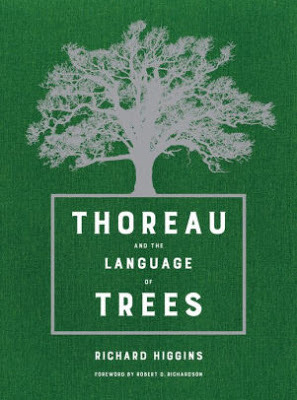
 A very long time ago, when Anne and I were deciding to move to the "country" -- the Pioneer Valley region in western Massachusetts in our case -- one of our Cambridge friends demanded to know how we could consider leaving the wonders of Boston-Cambridge behind.
A very long time ago, when Anne and I were deciding to move to the "country" -- the Pioneer Valley region in western Massachusetts in our case -- one of our Cambridge friends demanded to know how we could consider leaving the wonders of Boston-Cambridge behind. I said something like "we like trees." "But why would you give up people for trees?" he asked. "All people are different, and trees are all the same." That was too simplistic for me. I replied -- flippantly -- "But I think trees are all different, and people are all the same." I don't really think (and didn't then) that people are all the same. Far from it. But I would defend a different sort of comparison in defense of trees and other green plants: People are more important to other people, especially to those who care about him. But the well-being of trees is much more important than people are to the health and survival of Planet Earth. Back in the days when we were making that logistical remove to the Pioneer Valley -- and a few years later would move back to Greater Boston for the same reason (so someone could go to graduate school) -- I had not read much written by Henry David Thoreau. Of course I knew him by reputation. Everybody did. We had all seen the popular poster with the quote: "In Wildness is the preservation of the world." I thought this was a metaphysical assertion. It's not. It's a scientific one. The world is still trying to catch up with the thought of Thoreau. Relatively little of his writing was published during his lifetime, or until well into 20th century. There was the famous essay on "Civil Disobedience," often read in schools and college courses -- I had a high school teacher who summed its message up for us -- defending the moral right of conscience to disobey immoral laws. The same kind of thinking would later guide Martin Luther King's adoption of nonviolent civil disobedience to drive what we now celebrate as the Civil Rights Movement. And Thoreau he wrote "Walden," a book that expresses his love of and devotion to nature, but employs it in service of a sweeping critique of the settled norms of civilized society. Human beings should try to live their lives in close contact, and harmony, with the natural world, instead of working hard to shut it out, conquer it, master it, and cut it down. Particularly when that 'it' is trees. While "Walden" is now regarded as a classic -- though more celebrated than actually read: Thoreau's elaborate Victorian prose can be hard sledding at times for contemporary quick-cut sensibilities -- it was almost entirely ignored by 19th century America. Thoreau also published a few essays that ran in the mainstream press or magazines, and remain highly readable today. But scholars and students of his work now regard Thoreau's journal, accounts of his daily forays into the woods around Concord, his record about what he found there, and his thinking about 'life' -- human as well as natural -- prompted by those countless hours spent out of doors. Reading sample passages from of these, excerpted in the recent book "Thoreau and the Language of Trees" by Richard Higgins, convinces me that Thought is that rarity of any time and place: an original thinker. His journals -- running many manuscript volumes and something like a million words -- only began to began to be published in recent decades. And editorial preparation of a complete editions of his journals -- in 16 volumes, a massive project -- is still going on today. For most of us, a book of excerpts and editorial comment such as "Thoreau and the Language of Trees" makes Thoreau the thinker-naturalist accessible and rewarding as well as providing a good opening into the inveterate walker, naturalist, and writer's marvelous vision. Here are some high points I've skimmed from this book. A passionate lover of autumn, Thoreau mined his journal for material for an essay titled "Autumn Tints" published in the Atlantic Monthly in 1862, and widely praised at a time when Americans were looking for something to feel good about. Autumn to Thoreau was a freely offered annual festival that should be celebrated as a national holiday. That the tinting and then release of these beautifully colored leaves ultimately leave the forests bare for winter is part of the beauty and meaning of the natural display: "How beautifully they go to their graves! how gently lay themselves down and turn to mould! ...They that soared so loftily, how contentedly they turned to dust again, and are laid low, resigned to lie and decay at the foot of the tree and afford nourishment to new generations of their kind, as well as to flutter on high! They teach us how to die. One wonders if the time will come when men... will lie down so gracefully and as ripe..." Now that's something to holds onto: "They teach us how to die." In his editorial introduction of a particularly interesting group of excerpts, Higgins tells us that Thoreau discovered the scientific study of plants in the latter half of his short life. Botany was an emerging science then, and Thoreau consumed books by its leading figures. He sent specimens to Louis Agassiz, the famous Swiss-born naturalist who studied earth's natural history at Harvard. Thoreau's daily walks became field work. He identified all the species he countered, and theorized on their structure, growth pattern, annual phases, and stages of life. Observing that pines replace oaks that die (or more likely are cut for timber), and that oaks replace pines (same reason), he hypothesized that trees' seed covers were designed to ride on the wind for long distances, and was able to prove his theory. He theorized that the fruits of trees that humans today grow for consumption were developed to tempt animals to spread their seeds. Thoreau applied Darwin's new theory of evolution to his own field work observations. He studied forest regeneration, documented it, and invented the widely adopted term "succession" for the stages of a forest's lifetime. His essay "The Succession of Forest Trees" was published in the New York Tribune and widely read. He also noted how late maturing (and long-lived) trees typically were. While foresters 'harvested' trees when their trunk diameters stopped growing, Thoreau noted the trunks were still growing tall and adding more wood. He used the term "mythology" to describe his detailed interpretation of the stages of life in the lifetime of trees -- a tale, that is, rich with meaning meaning about life's fundamentals. He saw trees as the templates of creation. Models for other creatures, among them human beings. "There are flowers of thought," he wrote, "and there are leaves of thought." In "Walden," he wrote, "the Maker of this earth but patented a leaf." A new idea, he stated, "is like a bud on a branch." Elaborating the comparison of trees and humans, he saw an analogy between the structure of a tree, from root through trunk to crown, and the skeleton of the human being and the higher vertebrates. These comparisons were called "correspondences," Higgins tells us. Trees, he noted, grow both in spring and in fall. All humans grow in the springtime of their lives, Thoreau pointed out, but some also enjoy the autumnal second growth of maturity. Many humans, however, "never recover form the first check to their hopes." Judging from the excerpts in this book, and Higgins's commentaries, it appears that Thoreau thought that he was recovering from his own 'first check' -- the failure of his first books to win the favor of an audience -- and enjoying a rich personal growth through his study of nature. In his late essay "Wild Apples" he compared himself to the wild tree that after being "mauled" by animals that consumed its fruit and damaged its limbs, "grows back" to produce a perfect, tangy fruit. Like the wild tree, Thoreau continued to do his best work, though his first fruits, his first two books ("Walden" and "A Week on the Concord and Merrimack Rivers"), had been harmed by a neglectful publishing world and by an unready audience. It seems that this writer and thinker who flourished and produced masterworks ahead of his time in the middle of the nineteenth century, and was rediscovered in the next century and christened as a founding prophet of the environmental movement, may prove even more important in the 21st century as humanity, the dominant species in an age rife with species extinctions, poses an increasingly dire threat to the future of life on Planet Earth.
Published on June 06, 2018 21:12
June 2, 2018
Garden of Verse: Just Because It's June, Do We Have to Keep Graduating?
 I don't necessarily spend a lot of time thinking about high school (as in hardly any), but when the editor of Verse-Virtual, the online journal to which I contribute regularly, proposed the theme of "graduation" for the June issue, I found myself going back there. Graduation exercises are pretty much all the same, aren't they? But when you're the graduate who gives the speech, that makes it more of an experience.
I don't necessarily spend a lot of time thinking about high school (as in hardly any), but when the editor of Verse-Virtual, the online journal to which I contribute regularly, proposed the theme of "graduation" for the June issue, I found myself going back there. Graduation exercises are pretty much all the same, aren't they? But when you're the graduate who gives the speech, that makes it more of an experience. Poems of this sort, based on recounting personal history, are sometimes called "confessional." That term seems a little too heavy for most of what poets write about themselves. Maybe 'mini-memoirs' is a better name for these short story-like lyrics in which the speaker builds toward some kind of meaning, lesson, self-discovery, or pointed reflection.
Or maybe we're just trying to say, 'Here it is. Take it for what it's worth.'
Here's my poem about high school graduation.
Prophecy
They chose me to give the speech,
not the sort of invitation you can decline.
Then they asked to see a draft
and pronounced it pessimistic.
So I revised
(feels like I've been having this conversation
all my life),
and they declined to look again,
saying whatever I chose to say
would be all right.
But would it?
A third of the way through my wordy tome,
the massed ranks of my six hundred classmates
stared back at me cross-eyed -- some old gag
I fell for, skipping ham-handedly
to the last two pages, and
wrapping up with clarion endorsements
of Resolution and Individuality.
Nobody complained that I'd talked too short.
A girl I didn't know thanked me for 'trying
to say something real,'
not the usual graduation starting-out-on-life's-great-adventure
sort of stuff,
And I would have told her
that I'd stuck to my guns,
resisted pressures from the top
and stared down a crowd of frivolous peers
to make my solitary desert call,
except it wasn't true.
I have two other poems in the June issue. The poem titled "Graduate Women" also draws on personal experience.
The final poem,"The Masques of the Angels of Light," draws on my understanding of spiritual traditions from both West and East to suggest a "moving on" experience of a different sort.
You can read them in the June 2018 issue of Verse-Virtual and the poems of all the issue's contributors here:
http://www.verse-virtual.com/poems-and-articles.html
Published on June 02, 2018 12:20
May 31, 2018
The Garden of High Spring: May Opens the Door, the Poppies (and Other Contemporaries) Pop Out
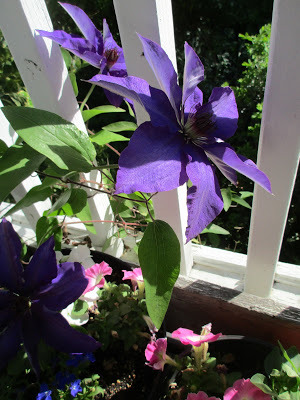
My theory is there's a lot of water in the ground this year. Lots of water means lots of plants. Many, many plants necessarily include a stunningly large helping of weeds. Lots of water means lots of of all sorts of other life as well.
Birds in the trees, mobbing the bird feeder. Lots of food out there by now, guys!
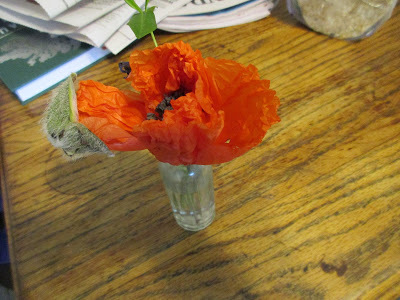 But they chitter and chirp and dive-bomb the feeder stations. Pulling the seed out, and shouting the whole day, just as if they've just arrived from a long winter vacation. That abundance of life includes living things we sometimes unhappily encounter withdrawing blood from our exposed flesh.
But they chitter and chirp and dive-bomb the feeder stations. Pulling the seed out, and shouting the whole day, just as if they've just arrived from a long winter vacation. That abundance of life includes living things we sometimes unhappily encounter withdrawing blood from our exposed flesh.
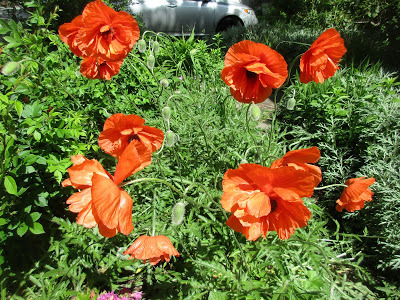 A lush, wet, warming-up is good for mosquitoes and other living things. No roses without thorns. ...So where to start? Poppies: popping up all over.They spread, growing each year more dense, turning our little piece of sidewalk-side plot into a fertile hillside in western Asia.
A lush, wet, warming-up is good for mosquitoes and other living things. No roses without thorns. ...So where to start? Poppies: popping up all over.They spread, growing each year more dense, turning our little piece of sidewalk-side plot into a fertile hillside in western Asia.
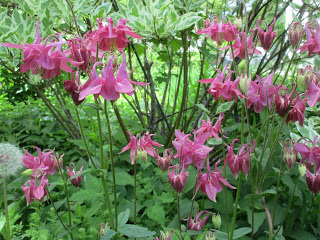 Very clannish, they all come out together. Bloom in huge muddle of paper electric-orange petals, blow all at once, then drop those crepe-paper petals on the sidewalk altogether. The entire cycle lasting but a couple of weeks.
Very clannish, they all come out together. Bloom in huge muddle of paper electric-orange petals, blow all at once, then drop those crepe-paper petals on the sidewalk altogether. The entire cycle lasting but a couple of weeks.
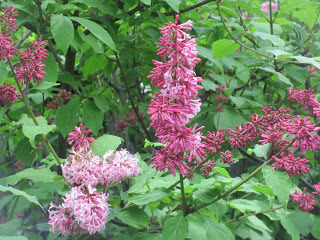
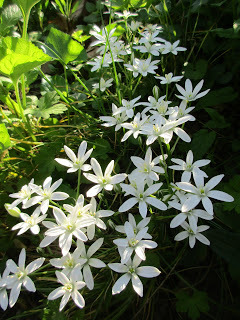 The second photo down enshrines our rescue of the premature poppy bud that broke off before opening. Anne put it in water in a tiny vase, with only a miniscule seam of orange showing. I doubted it would blossom. The next day it time-lapsed in front of our eyes. By the time I got the camera out, the flower was shrugging off the last corner of its covering like a teenager kicking off a shoe. The short, exuberant life of the Mister Mucho Orange.
The second photo down enshrines our rescue of the premature poppy bud that broke off before opening. Anne put it in water in a tiny vase, with only a miniscule seam of orange showing. I doubted it would blossom. The next day it time-lapsed in front of our eyes. By the time I got the camera out, the flower was shrugging off the last corner of its covering like a teenager kicking off a shoe. The short, exuberant life of the Mister Mucho Orange. The second shot is a group poppy flop-in from the first couple days of opening. I suppose if these things happened all the time, I wouldn't pay so much attention. But it's only once a year. Poppies lead the parade into clematis. In the top photo they are forcing their way up to the porch and through the railings. As if dropping for tea. Actually, I think they expect champagne. Columbine, fourth photo down, takes a bow in May as well.
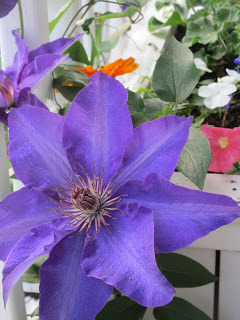 Lilac season, fourth pic down, very exuberant as well ths year. The two lilac trees look a lot different, but their blooms look and behave a lot alike, and we are still in high perfume.Wiegelia sharing front yard billing with one of the lilacs.
Lilac season, fourth pic down, very exuberant as well ths year. The two lilac trees look a lot different, but their blooms look and behave a lot alike, and we are still in high perfume.Wiegelia sharing front yard billing with one of the lilacs.
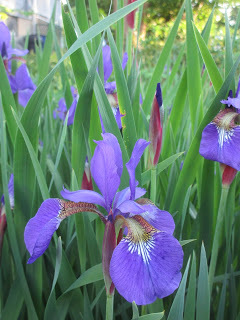 Have I mentioned Iris, a solid late-May performer, often showing well into June. Two big whites were the first to open, the day before we left to spend Memorial Day weekend in the Berkshires. The Siberian Iris just above igreeted us among a full platoon of his fellows on our return.bearded The fourth photo down depicts the Columbine, another mid-May favorite.
Have I mentioned Iris, a solid late-May performer, often showing well into June. Two big whites were the first to open, the day before we left to spend Memorial Day weekend in the Berkshires. The Siberian Iris just above igreeted us among a full platoon of his fellows on our return.bearded The fourth photo down depicts the Columbine, another mid-May favorite. The sixth photo down shows the white allium that pop up every year all over the garden by means of their own devising.
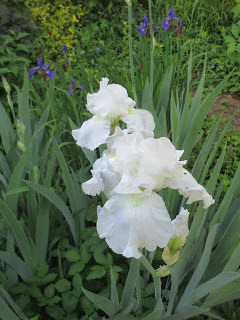
Published on May 31, 2018 21:37
May 21, 2018
The Garden of the Heart: Flower Language
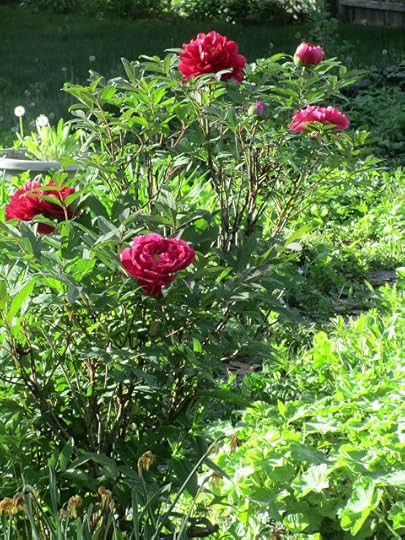
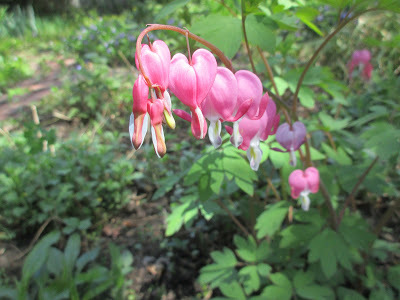
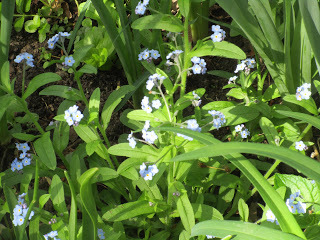 That flower to the left, in the second photo from the top of page: It's called "Bleeding Heart." So in the language of flowers, what does it mean to send one of these to someone else?
That flower to the left, in the second photo from the top of page: It's called "Bleeding Heart." So in the language of flowers, what does it mean to send one of these to someone else?
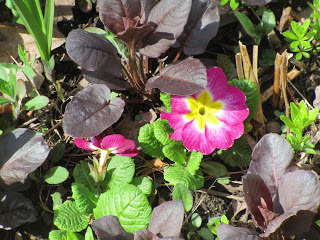
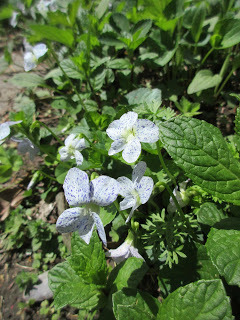 Does it mean you express your emotions openly? Or is it meant to say "spurned or rejected" affection? Or that the recipient is too sensitive? Does it express your unconditional love for all creation? Or your belief in a connection between two people enduring beyond life? Well, actually, all of them, according to the sources I discovered online when I tried to learn something about the language of flowers. Also called floriography, "flower language "is a means of cryptologicalcommunication through the use or arrangement of flowers," according to Wikipedia. I.e. a code. The sources find it rooted in ancient cultures, citing symbols in the Hebrew Bible's "Song of Songs," and practices throughout Europe, Asia, and the Middle East. Some cite its development (or 'flowering'?) in the Ottoman Empire, before it spread to western Europe. In Elizabethan England we find the 'meanings' of flowers playing a prominent role in Ophelia's "mad scene" in Shakespeare's "Hamlet." The practice boomed in 19th century England and the United States, a response I'm guessing to the Romantic movement in poetry and the other arts. The repressive code of manners in Victorian England furthered the use of gifts of flowers, or specific flower arrangements (I find), to say things "that could not be spoke aloud" in gentile society. I'm not a big fan of repression. On the other hand, if it opened the door to "saying it" with flowers, that's kind of cool. And I can't believe that there isn't a Japanese equivalent . Here's a glossary of the emotional correspondences assigned to many common flowers: http://thelanguageofflowers.com/ So if someone offers you a blue hyacinth, that's an expression of "constancy." A violet? "Modesty" (bottom photo). Which, as a compliment, can cover a lot of ground. The red peony pictured at the top of the page -- I like this one: "Happy marriage." Forget-me-nots, not surprisingly, signify either 'true love' or 'memories.' And "ivy" -- there seems to be a big call for flower sentiments of this kind -- expresses "wedded love" and "fidelity." Of course there are also many varieties of ivy (I don't think they were thinking of poison ivy). English ivy, maybe. It's not all good. A cyclamen (a good wintertime indoor plant) signifies "resignation" or even "goodbye." A daffodil, of which we see so many in the early spring, stands for "unrequited love." Wow, that's a lot of heartache. A begonia means "beware." And a primrose (fourth photo down) means "I can't live without you."
Does it mean you express your emotions openly? Or is it meant to say "spurned or rejected" affection? Or that the recipient is too sensitive? Does it express your unconditional love for all creation? Or your belief in a connection between two people enduring beyond life? Well, actually, all of them, according to the sources I discovered online when I tried to learn something about the language of flowers. Also called floriography, "flower language "is a means of cryptologicalcommunication through the use or arrangement of flowers," according to Wikipedia. I.e. a code. The sources find it rooted in ancient cultures, citing symbols in the Hebrew Bible's "Song of Songs," and practices throughout Europe, Asia, and the Middle East. Some cite its development (or 'flowering'?) in the Ottoman Empire, before it spread to western Europe. In Elizabethan England we find the 'meanings' of flowers playing a prominent role in Ophelia's "mad scene" in Shakespeare's "Hamlet." The practice boomed in 19th century England and the United States, a response I'm guessing to the Romantic movement in poetry and the other arts. The repressive code of manners in Victorian England furthered the use of gifts of flowers, or specific flower arrangements (I find), to say things "that could not be spoke aloud" in gentile society. I'm not a big fan of repression. On the other hand, if it opened the door to "saying it" with flowers, that's kind of cool. And I can't believe that there isn't a Japanese equivalent . Here's a glossary of the emotional correspondences assigned to many common flowers: http://thelanguageofflowers.com/ So if someone offers you a blue hyacinth, that's an expression of "constancy." A violet? "Modesty" (bottom photo). Which, as a compliment, can cover a lot of ground. The red peony pictured at the top of the page -- I like this one: "Happy marriage." Forget-me-nots, not surprisingly, signify either 'true love' or 'memories.' And "ivy" -- there seems to be a big call for flower sentiments of this kind -- expresses "wedded love" and "fidelity." Of course there are also many varieties of ivy (I don't think they were thinking of poison ivy). English ivy, maybe. It's not all good. A cyclamen (a good wintertime indoor plant) signifies "resignation" or even "goodbye." A daffodil, of which we see so many in the early spring, stands for "unrequited love." Wow, that's a lot of heartache. A begonia means "beware." And a primrose (fourth photo down) means "I can't live without you."I agree. I can't live without flowers. Or what they mean.
Published on May 21, 2018 20:40
May 14, 2018
The Garden of Verse: Poems in May Grow Flowers, Fathers, and the Hard To Explain
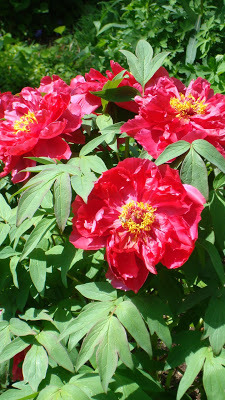 We may be celebrating Mother's Day this month, but fathers are also showing up big in some poems in May's Verse-Virtual. So are flowers, perhaps unsurprisingly, given the season. So is the uncanny. In Laurie Bryo's poem "Mask," the soul of a father appears to have spread itself over the natural realm, in a raccoon that "swaggers" into the house and in further reflections of the forest: "wing for hair,
We may be celebrating Mother's Day this month, but fathers are also showing up big in some poems in May's Verse-Virtual. So are flowers, perhaps unsurprisingly, given the season. So is the uncanny. In Laurie Bryo's poem "Mask," the soul of a father appears to have spread itself over the natural realm, in a raccoon that "swaggers" into the house and in further reflections of the forest: "wing for hair,leaves for mouth, stream for skin." Then the imagery leaves natural correspondences behind: "Meanwhile,
rain fills each empty shoe. A lost shoe on the moon fills
with stardust. Meanwhile, each courage teacher coversher eyes with brown pebbles, removes a periwinkle shell
battered from tumble. A lawyer soothes his throat with honey
bees." The imagery lets go. It's eerie, but also wonderful -- and beautiful.
Sarah White's "Poems by Sons," tells us that men often write about their fathers. Again, we're offered tantalizing images: "as a man looking out
the window at a lone crow on the road,
or a man shaving while steam
from a small boy’s adoration
rises and clouds the mirror." I particularly like the cinematic close-up of a father "looking out the window at the lone crow," but the poem points out the weakness of the second picture. As the son realizes when he becomes a father, it's unlikely that Dad shaves with a cloudy mirror. These "Poems by Sons" may tell us little about the fathers, but a good deal more about the sons.
Why do gardeners make a fuss over their flowering plants? Maybe because they keep teaching the same lesson -- that nothing in life lasts forever, yet life keeps coming. -- and we keep needing to learn it. Linda Fischer's "A Field of Flowers" depicts the gardener "edging a length of the garden
as precisely as a rolled hem." The poem takes the comparison further: "Like the gown I once stitched,
languishing in a closet of clothes
I can no longer wear,
horticulture knows but a brief
season." But I'm not finding a poem about the futility of labor here. Read what the gardener's "hands reach for" at the end of this poem.
There is more to heaven and earth than we can find a place for in our philosophy, as comprehensive as we try to make it. In Michael Minassian's surprise-packed fantasy "In the Back Yard I Found a Rotary Phone," we discover that rotary phone humming in the 'garden,' an unidentified "she," a wingless "angel," "tiny gods in aero planes," and the contemplation of a "lamb's kiss." Best of all we have this vision: "flowers stood about at the end of their wits" Sometime I know just how those flowers feel. We're 'projecting,' of course. This poem makes us stand up and take notice.
In an "Unnamed Country" by Mary Makofske, life's garden has narrowed to a single tulip on the pavement -- dropped by a hurrying "flower vendor" or perhaps a "husband bearing from the florist shop
an anniversary bouquet." In the panic of the moment, no one among the few who slink beside the buildings will stoop to pick that it up. Once again, a poem makes us see ourselves in flowers -- a solitary flower reduced to "these yellow petals and this fragile throat." The starkly abandoned flower tells us all we need to know of what has happened here.
Angels, those products of poetic imagination without whom we simply cannot do (Rilke, famously, couldn't) make a forceful appearance in Penny Harter's "Honoring Angels": "one grabbed my hair
and swung me round and round as if we were
playing a child’s game. I knew she would
soon let go, flinging me into the coral mist
surrounding us both..." This visionary image, the poem tells us, can be understood in more than one way. In the grasp of that angel, we pay close attention.
More transcendent images appear in Tricia Knoll's poem with the Yeatsian title "The Opera Company Sells Its Costumes": "Clouds
hover as we wrap up inside sequined warrior
fatigues, mummy wraps, gowns smirched with blood
from spousal blows, neoprene court jackets,
or wool doublets of shepherds." The poem soars, leaving the material facts of the weather charts -- "clouds" -- behind. Sometimes leaving our everyday language behind is the only way to fly. And what an interesting sound that word "neoprene" makes. I had to look it up and was rewarded with this mouthful: "neoprene: synthetic polymer resembling rubber, resistant to oil, heat, and weathering." Poems are also resistant to weathering.
In Robert Wexelblatt's "A Moment's Change," we meet another flower: "Imagine her coming into the room
smiling because she knows you still love
her; how then that smile shrivels
promptly as Mojave mariposas." Mojave mariposas, another wonderful mouthful, are also new to me. Poems send us to places we haven't been (Mojave in my case). But we're familiar with the concept of 'quick-blooming,' as we are as well with the word "prognosis," which follows quickly in this tightly-written, devastating poem.
In Michael Gessner's beautifully written poem "Painted Hands," we learn: "The ancients used slick swells of stone
walls and ceilings to give the impression
of moving upward in the flickering light,
often found in recesses absent
of any forms of human life
as if yearning had no body." The phrase "as if yearning had no body" responds to the image of handprints on stone that accompanies this poem so perfectly that we already have more than enough here to remember. But this poem has more for us, especially its final speculation on what these images of ancient hands on stone may say to us about the longing for community, or perhaps 'communion.'
A lot of wonderful poems in this May 2018 issue of Verse-Virtual, with a lot to say to us. You can find them here: http://www.verse-virtual.com/poems-and-articles.html
Published on May 14, 2018 10:02
May 8, 2018
The Garden of the Seasons: Back to Life
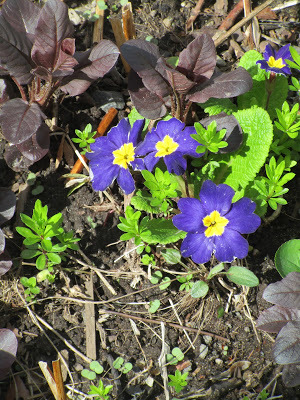
It's hard to illustrate in a photo of a single plant, or colony, however advanced or retrograde that plant's progress is, how the look of things has changed in the overall, everywhere-you-look perspective.
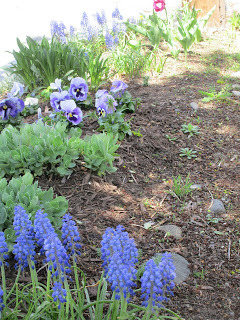 Green everywhere, color popping up here and there in various places. The expected ones, the Vinca Minor and the bulbs, but also in the largely forgotten habitues of late May, seen now for a week or two, but then retreating back into masses for the rest of the year. The Japanese primrose (top photo) for instance. Very small, competing for space and earth and nutrients in a level bed overrun in recent years by tall lanky loosestrife.
Green everywhere, color popping up here and there in various places. The expected ones, the Vinca Minor and the bulbs, but also in the largely forgotten habitues of late May, seen now for a week or two, but then retreating back into masses for the rest of the year. The Japanese primrose (top photo) for instance. Very small, competing for space and earth and nutrients in a level bed overrun in recent years by tall lanky loosestrife.
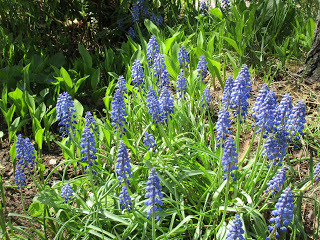 I rush to take its picture now, before the big boys get up, stretch, and stand up straight, leaving the spring bloomer to hide in the shade until another chance next year. This strongly violet colored flower is matched by another plant of what appears to be the same variety of primrose, but blooms a dark pink. Anne sees these blues and pinks matching up on the dance floor of the Kingdom of Plants.
I rush to take its picture now, before the big boys get up, stretch, and stand up straight, leaving the spring bloomer to hide in the shade until another chance next year. This strongly violet colored flower is matched by another plant of what appears to be the same variety of primrose, but blooms a dark pink. Anne sees these blues and pinks matching up on the dance floor of the Kingdom of Plants. Looking to learn something about the primrose, I end up learning about its name. The prim is from "prime," and primrose symbolizes youth because they bloom in the early spring. In Norse mythology the primrose is connected to Freya, the goddess of love.
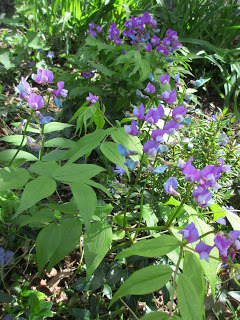 Another spring visitor is a plant called Spring Vetch (pictured at left). Its buds open before I can stop shivering in my daily visits to April's versions of spring. It is peaking now . It grows in a place very close to a very big oak tree, a site not many plants attempt. I'm not sure what moved me to place it there in the early years. A lot of trials; a lot of errors.I have the impression that the plant enjoys the lack of competition for space on a site where it, unlike most competitors can manage to bud and blossom and go to seed before the tree overhead fully leafs out and blocks all the sun. It gets its sun when the getting's good. According to a very botanically correct website, http://www.luontoportti.com/suomi/en/kukkakasvit/spring-vetch
Another spring visitor is a plant called Spring Vetch (pictured at left). Its buds open before I can stop shivering in my daily visits to April's versions of spring. It is peaking now . It grows in a place very close to a very big oak tree, a site not many plants attempt. I'm not sure what moved me to place it there in the early years. A lot of trials; a lot of errors.I have the impression that the plant enjoys the lack of competition for space on a site where it, unlike most competitors can manage to bud and blossom and go to seed before the tree overhead fully leafs out and blocks all the sun. It gets its sun when the getting's good. According to a very botanically correct website, http://www.luontoportti.com/suomi/en/kukkakasvit/spring-vetch
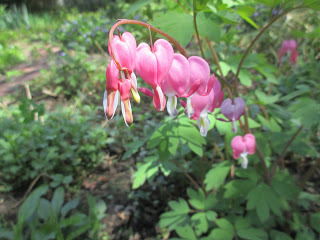 the plant Lathyrus vernus, also named 'Spring Pea,' and 'Spring Vetchling' grows in the form of a perennial herb, up to a height of 8 to 15 inches. Frankly, our two plants are there already. Here's the rest of the site's pretty tart description of its appearance: "Stem erect, bristly, wingless, almost glabrous." Glabrous sends me searching the internet again, where I find this definition:
the plant Lathyrus vernus, also named 'Spring Pea,' and 'Spring Vetchling' grows in the form of a perennial herb, up to a height of 8 to 15 inches. Frankly, our two plants are there already. Here's the rest of the site's pretty tart description of its appearance: "Stem erect, bristly, wingless, almost glabrous." Glabrous sends me searching the internet again, where I find this definition: "the technical term for a lack of hair, down, setae, trichomes or other such covering." OK, done with technical.
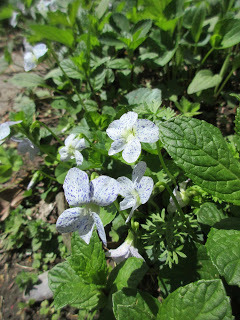 Vetch is actually quite fetching in its season. Which is now. Other perennials, blooming or not, change every day, filling in the space, in a rush to claim all they can claim, making this early May period in one sense the most exciting part of the year. The fast-spreading species, like the Vinca Minor and the wild violets (bottom photo) that flower now, blossom everywhere they've spread too. Or if a plant is alone in the world of the garden -- just one place, one moment -- like this small patch of spring vetch, or the two primroses -- they go all out.
Vetch is actually quite fetching in its season. Which is now. Other perennials, blooming or not, change every day, filling in the space, in a rush to claim all they can claim, making this early May period in one sense the most exciting part of the year. The fast-spreading species, like the Vinca Minor and the wild violets (bottom photo) that flower now, blossom everywhere they've spread too. Or if a plant is alone in the world of the garden -- just one place, one moment -- like this small patch of spring vetch, or the two primroses -- they go all out. We'll see the leaves of the violets all year, but only have the violet blossoms for these couple of weeks. They take their opportunity now before larger plants crowd them out, and the trees leaf out to take their lionish share of the sunlight.
Daffodils blooming a bright yellow last week have faded this week. Their little clock has chimed all its hours. I always think, I should cut a few and bring them indoors.
Some other early blooming perennials shown in these photos are the tulip, grape narcissus (the spiked blue flowers seen in the second and third photos down), the bleeding heart (second to last photo).
Published on May 08, 2018 12:45
May 2, 2018
The Garden of the Seasons: Happy May Day!
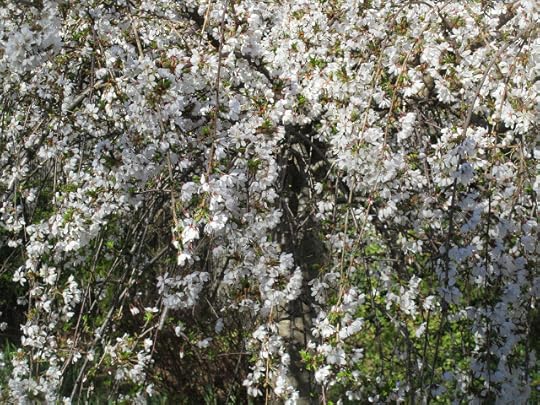
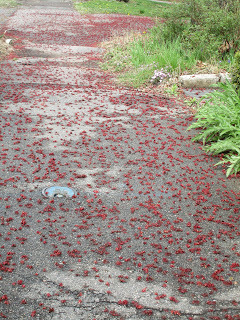
Happy May Day, everybody. For much of the world May Day is a holiday for working people, who march in great numbers down the main streets of capital cities, or join protests -- against a corrupt president in the Philippines, or their exploitation as migrant workers in a wealthy country -- or defiantly celebrate a 60-year-old revolution inspired by people like Che Guevara.
For those of us living in New England, it's like "OK, maybe we can walk around in shirtsleeves for a couple of days. When the weather changes for the better on a fortunate date -- this sunlit, steadily warming First of May -- everything looks better. Truthfully, the last week of April warmed up sufficiently for me to make progress out of doors in clearing last year's debris from the perennial garden. The weeping Japanese tree (top of page) had its own cherry blossom season.
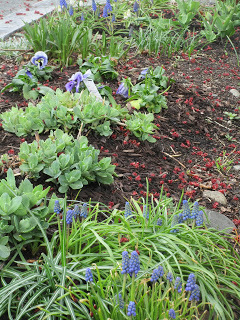 The blossoms on the red maple tree out front rained down after an all-day shower and turned the sidewalk into a spatter canvas by some artist who really liked red. The vinca blossomed and spotted up violet (see bottom photo), about two weeks behind its usual schedule, in its many expanding colonies. The English ivy, that covers literally everything in its path, including a once-thick patch of Vinca Minor, received a two-hour gloved-hands thinning on a mild Saturday afternoon. The birds sang, and in the case of the robin posed politely for photo (see second from bottom photo), and we continued to feed them.
The blossoms on the red maple tree out front rained down after an all-day shower and turned the sidewalk into a spatter canvas by some artist who really liked red. The vinca blossomed and spotted up violet (see bottom photo), about two weeks behind its usual schedule, in its many expanding colonies. The English ivy, that covers literally everything in its path, including a once-thick patch of Vinca Minor, received a two-hour gloved-hands thinning on a mild Saturday afternoon. The birds sang, and in the case of the robin posed politely for photo (see second from bottom photo), and we continued to feed them.
 A woodchuck meandered through our neighbor's lawn and took a sharp U-turn when he saw us coming. A nuthatch visited our feeder and then did a quick inspection of a nearby tree in his customary tail over head, upside-down-appearing fashion. The other birds resisted the temptation to imitate him and kept their own heads high.
A woodchuck meandered through our neighbor's lawn and took a sharp U-turn when he saw us coming. A nuthatch visited our feeder and then did a quick inspection of a nearby tree in his customary tail over head, upside-down-appearing fashion. The other birds resisted the temptation to imitate him and kept their own heads high.
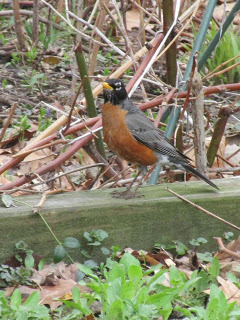 The hyacinths deepened their hues. The Japanese primrose made its annual early-spring appearance (see fourth photo). It has since opened two more blossoms.
The hyacinths deepened their hues. The Japanese primrose made its annual early-spring appearance (see fourth photo). It has since opened two more blossoms.
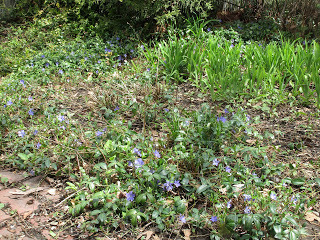 The pansies and the grape hyacinth brightened up the sidewalk strip (see third photo from top).
The pansies and the grape hyacinth brightened up the sidewalk strip (see third photo from top).We're hoping all these new friends will soon have plenty of company.
Published on May 02, 2018 08:52
April 30, 2018
April Poems Run Out the Days: The Longest War, Following a Plath, Postcard Poetry, and a Tarot Reading Close to Home

April is a fast-moving month with, nevertheless, a lot of days. I've been trying to write a new poem each, though letting myself get behind and then catching up by writing three in one day. I have mixed feelings about coming to the end. I'll miss these prompts from National Poetry Writing Month, weird as they sometimes are. And now I won't have my daily excuse to put off whatever else I'm supposed to be doing. Goodbye April, it's been good to know you. Here are the last four, including some of the weirdest and silliest.
4.30 The Prompt: "Write a poem that engages with a strange and fascinating fact. It could be an odd piece of history, an unusual bit of art trivia, or something just plain weird." Response: Here's the fun fact I discovered: "Officially, the longest war in history was between the Netherlands and the Isles of Scilly, which lasted from 1651 to 1986. There were no casualties." This is both weird and (trust me) largely trivial. How can you have a 'war' against a few islands off the coast of Cornwall? Anyone born in the UK will think I'm just an American boob, but I have never heard of The Isles of Scilly and the name just drives me --- silly. There is an explanation for this doddering 'fake' war (you can find a short version here: https://en.wikipedia.org/wiki/Three_Hundred_and_Thirty_Five_Years%27_War), but it's not a very good explanation, so I ended up doing what I was afraid of all along -- just being silly.
The Longest Bore
There once was an island called ScillyThe name of which simply is sillyWhen you open a window or look at the door,All you see is an over-puffed war.
The people all dress up like clownsAnd make the most mocking of sounds When the Dutchmen arrived,thinking to thrive They were met by "Hey Downy-down-downs!"
When the Norse sailed to the isles Scyllingjar The sillies hoped they wouldn't get far But they came under attackby Swein, Erik, and Jack It's tale you can keep in a jar.
In the days of old King CnutNo Englishmen gave them a hoot Till their navy was wrecked By a storm out of Brecht And incorporation followed 'Sweet toot'!
It came in the late Civil War The Dutchmen King Charles did abhor His fleet skulked in Scilly, knocking Dutch trade willy-nilly, And the Netherlands let out a roar
Now here is a jig and a rompThe Dutch sent an admiral named TrompHe started a warlasting three centuries and more --
So take care what you startWhen you select an old fart who's lacking both brain and a heart --
And everyone shouts, "What a bore!"
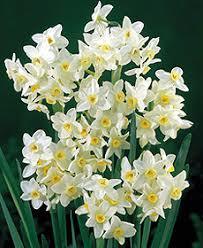 4.29 The Prompt: "We’d like to challenge you to write a poem based on the Plath Poetry Project’s calendar. Simply pick a poem from the calendar, and then write a poem that responds or engages with your chosen Plath poem in some way."My response: Trying to write like Sylvia Plath sets the bar pretty high. Here's the poem I chose to "engage," which she wrote in the month of April."Among the Narcissi" by Sylvia Plath Spry, wry, and gray as these March sticks,
4.29 The Prompt: "We’d like to challenge you to write a poem based on the Plath Poetry Project’s calendar. Simply pick a poem from the calendar, and then write a poem that responds or engages with your chosen Plath poem in some way."My response: Trying to write like Sylvia Plath sets the bar pretty high. Here's the poem I chose to "engage," which she wrote in the month of April."Among the Narcissi" by Sylvia Plath Spry, wry, and gray as these March sticks,Percy bows, in his blue peajacket, among the narcissi.
He is recuperating from something on the lung.
The narcissi, too, are bowing to some big thing:
It rattles their stars on the green hill where Percy
Nurses the hardship of his stitches, and walks and walks.
There is a dignity to this; there is a formality-
The flowers vivid as bandages, and the man mending.
They bow and stand: they suffer such attacks!
And the octogenarian loves the little flocks.
He is quite blue; the terrible wind tries his breathing.
The narcissi look up like children, quickly and whitely.
My poem attempts to respond by borrowing Plath's theme and placing it in another setting. Once again, flowers figure.
April's Sick
Sick with the ick of a knife-probed stomachHe paces the sidewalk in dead-legged swoonImmune to the flowers of May and April.Nameless they crawl to the bones of the curbside,With low expectations of June
He's Barrett, an esopha-guy, a man of many organs.Inside his gut the tests find no bargains,And the surgeon says 'No more.' He complains he's lost his appetiteAnd pretends to walk to the store.
Curbside orphans, I guess you'd call themNot a rose, he knows, in this spotty patch,A place where smiling dogs will maul them. "Get yourself an old mutt," they tell him,Something else to worry about.
Sick with the kick of the late prognosis, He takes what the endless sidewalk yields.Flowers, again -- is it that time of year?He turns off the news, the weather, the fear, And wears the well-worn pavement out.
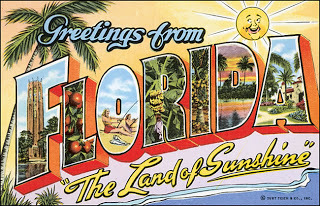 4.28 The Prompt: "We challenge you today to draft a prose poem in the form/style of a postcard. If you need some inspiration, why not check out some images of vintage postcards?"
4.28 The Prompt: "We challenge you today to draft a prose poem in the form/style of a postcard. If you need some inspiration, why not check out some images of vintage postcards?" Greetings, Bro, From the Land of Sunshine
Wish you were here! Wow, this whole state is mostly water,interrupted by squares of reclaimed land,with the water pumped into inland channels!Only the fish (and lizards -- and gators!) know Florida!Many fine latest-trend restaurants in walking distancepast huge puddles shining in streetlights, bubbling up at high tidebetween new construction.Come on in! The water is spectacular! Old nor'easter roiling the ocean into horizontal Niagara,all the jellyfish pounded to pieces. I am in a state! All wet, or lying around in the sun, or both.You won't recognize me!Babe & me are on the trail of Ponce de Leon and won't return until we are years younger(and probably still drying off). Ha!
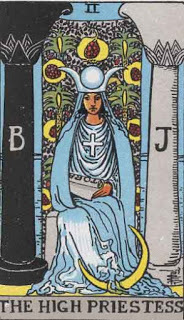 4.27 The Prompt: "Following [the] practice of relying on tarot cards to generate ideas for poems, we challenge you to pick a card (any card) from this online guide to the tarot -- "Pictorial Key to the Tarot" [http://www.sacred-texts.com/tarot/pkt/index.htm] -- and then to write a poem inspired either by the card or by the images or ideas that are associated with it."
4.27 The Prompt: "Following [the] practice of relying on tarot cards to generate ideas for poems, we challenge you to pick a card (any card) from this online guide to the tarot -- "Pictorial Key to the Tarot" [http://www.sacred-texts.com/tarot/pkt/index.htm] -- and then to write a poem inspired either by the card or by the images or ideas that are associated with it."My poem:
The High Priestess "She is really the Secret Church, The House which is of God and Man."*
Where do we find this Secret Church?Not on Sunday morning,when we linger long at breakfast,over two Sunday paperswith many renditions of the inner church such as Sunday Stilettos,Sur-real Estate,Sports fronted with Living Section stories about the nuances of mothering while defending tennis titles, accompanied by Big Glamour Shot
... And some complicated breakfast cookery like Cream of Wheat
But She is the moon, so perhaps when we stroll the garden in the cool of the eveningunder the sky of the little-known universeand -- in the perfect half-lightof the marriage of daylight and nightlight -- the face of the moon is the serene and beautiful mother of the Temple of the High Priestess,"the mystic temple"wherein one hears wisdom and birdsong and see the colors of the "flowing, gauzy mantle"of the veil of shimmering radiance(plus, of course, the birdsong)
She is the Shekinah of the morning commute,the four-dimensional pattern of interlocking bus lines,and battered rails, that lead to a swift and painless commute to a City Near Youor a hegira of all too common complications,interruptions, general dispensations of routine misery.
She is the "Daughter of the Stars,"not that day-timey life-waster starring yesterday's heroinesplus unfrocked abusers,but those flaming gas giantsthat turn the desert into the Elevated Transcendental Supernal Garden of Eveningswhere we end our evening strollsback in the Temple of Ordinary Evenings in Your Home Town,inscribed by Higher Law, and Picayune Law,and mother-in-law
and the in-dwelling bliss of the blessed kingdom of ancient days,endlessly recycled.
*from "Pictorial Key to the Tarot"
For the whole story on naprowrimo see:
http://www.napowrimo.net/2018/04/
Published on April 30, 2018 20:00



